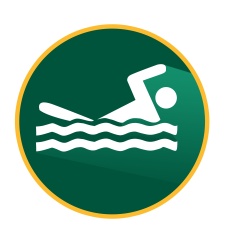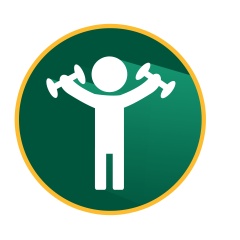Nicholas Welsh
Staff Writer
Once again, we all face the start of another school year. By now, many have turned to sharpening their minds for their upcoming classes, looking to shed off the summer rust that has built up in their brain. You can kiss goodbye to that rock-hard summer body, now it’s time to binge eat after you bomb your first midterm that you forget to study for, or gain the “Freshman 15″ like everyone says you will. Midnight pizza will become a food staple in the dorms, as well as the delicious snickerdoodle cookies baked fresh in the cafeteria. With the independent college lifestyle comes the overzealous caloric intake. Many are unprepared for the sudden change college brings, but there is a solution: USF’s gym, the Koret Health and Recreation Center.
Located a block away from campus, the Koret Center is just close enough to not have an excuse to not exercise. Koret is fully equipped; from a state of the art weight room to a 50-meter by 25-yard pool. If lifting or swimming is not your thing, rows of treadmills and other exercise machines line the second and third floors. Swig Pavilion and Hagan Gym provide multiple basketball courts, and there is also an equipment check-out area which stores basketballs, towels, locks, and other items. Access to these items is granted through your USF ID card, which is also your key to getting into the building. An extra incentive to exercise is that there is no fee when you visitthe Koret Center!
If you prefer organized, team-oriented activities, there are many club sports that you could join. Club sports offered include water polo, badminton, boxing, soccer, as well as less traditional sports such as Brazilian jiu jitsu, taekwondo, and table tennis. There are also many intramural sports that are a hit amongst USF students. On Thursday nights, many students can be found playing intramural basketball, which includes referees and jerseys that are provided by Koret. Indoor soccer, flag football, and kickball are just a few other popular intramural sports that are available. There is a small fee to join an intramural team, but as many students will tell you, it is well worth it.
If you are looking to advance your workout routine, Koret also offers group exercise classes. Zumba, TRX (Total Body Resistance Exercise) training, boxing conditioning, and self defense are a few of the classes offered.
Koret also provides services to help students adapt to their new college environment. On campus you will notice flyers advertising Welcome Weekends, which present chances for freshmen and transfer students to explore the city and make new friends early in the semester. Upcoming events include a trip to Fisherman’s Wharf on Aug. 23, and a bike ride around Golden Gate Park on Sept. 7. Students can also travel and meet other students through Outdoor Adventures, a program where groups of Dons come together to attend Giants games, visit Alcatraz, go horse riding, and more.


